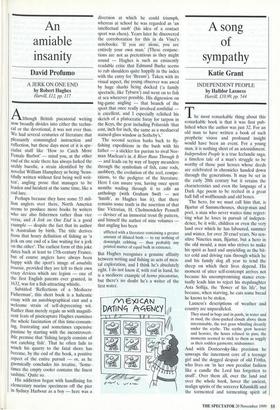An amiable insanity
David Profumo A JERK ON ONE END by Robert Hughes Harvill f12, pp. 117 Although British piscatorial writing now broadly divides into either the techni- cal or the devotional, it was not ever thus. We had several centuries of literature that pleasantly commingled instruction and reflection, but these days most of it is spe- cialist stuff like 'How to Catch More Female Burbot' — mind you, at the other end of the scale there has always lurked the archly bucolic, a strain identified by the novelist William Humphrey as being 'beau- tifully written without first being well writ- ten', angling prose that manages to be leaden and luculent at the same time, like a cod lure.
Perhaps because they have some 55 mil- lion anglers over there, North America seems to produce more books by writers who are also fishermen rather than vice versa, and A Jerk on One End is a good example — despite the fact that its author is Australian by birth. The title derives from that hoary definition of fishing as 'a jerk on one end of a line waiting for a jerk on the other'. The earliest form of this joke dates back at least to 17th-century France, but of course anglers have always been happy with the sport's image of amabilis insania, provided they are left to their own crazy devices which are legion — one of the first English patents ever granted, in 1632, was for a fish-attracting whistle.
Subtitled 'Reflections of a Mediocre Fisherman', this short book is a halieutic essay with an autobiographical cast and a welcome strain of self-deprecating wit. Rather than merely regale us with magnifi- cent feats of piscicapture Hughes examines the whole fascination of this time-consum- ing, frustrating and sometimes expensive pastime by starting with the incontrovert- ible premise that 'fishing largely consists of not catching fish'. That he often fails to winch his quarry to the fatal shore has become, by the end of the book, a positive aspect of the entire pursuit — or, as he gnomically concludes his treatise, 'Some- times the empty cooler contains the finest sashimi.' Quite so.
His addiction began with handlining for elementary marine specimens off the pier in Sydney Harbour as a boy — here was a diversion at which he could triumph, whereas at school he was regarded as 'an intellectual snob' (his idea of a contact sport was chess). Years later he discovered the corroboration for this in da Vinci's notebooks: 'If you are alone, you are entirely your own man.' (These conjunc- tions are not as pretentious as they might sound — Hughes is such an eminently readable critic that Edmund Burke seems to rub shoulders quite happily in the index with the entry for 'Bream'). Taken with its visual aspect, the young observer was awed by huge sharks being docked ('a family spectacle, like Tyburn') and went on to fish at sea wherever possible. His digression on
big-game angling that branch of the sport that once really involved tenibilita is excellent, and I especially relished his sketch of a plutocratic foray for tarpon in the Keys, the gear including Polaroids 'that cost, inch for inch, the same as a mediaeval stained-glass window in Sotheby's.'
The second section harks back to fly- fishing expeditions in the bush with his father — a stickler for purism to rival Nor- man Maclean's in A River Runs Through It — and leads on by way of happy meanders through the symbolism of fish, cane rods, snobbery, the evolution of the reel, compe- titions, to the pedigree of the literature. Here I can assure you, having once spent months wading through it to edit an anthology (with Graham Swift — not 'Smith', as Hughes has it), that there remains some truth in the assertion of that fine Victorian, H. Cholmondeley Pennell — deviser of an immortal trout fly pattern, and himself the author of nine volumes that angling has been
afflicted with a literature containing a greater amount of diluted bosh — to say nothing of downright cribbing — than probably any printed matter of equal bulk in existence.
But Hughes recognises a genuine affinity between writing and fishing as acts of men- tal exploration, and I think he's absolutely right. I do not know if, with rod in hand, he is a mediocre example of homo piscatorius, but there's no doubt he's a writer of the first water.


























































































 Previous page
Previous page